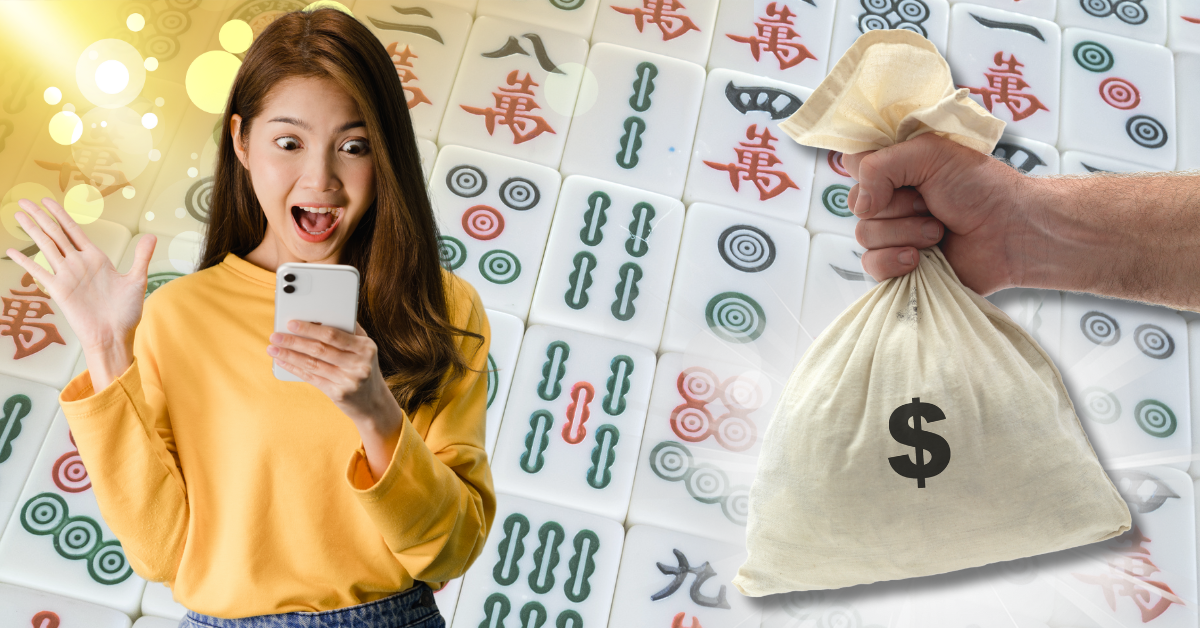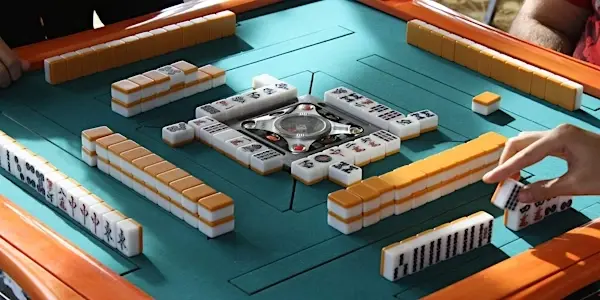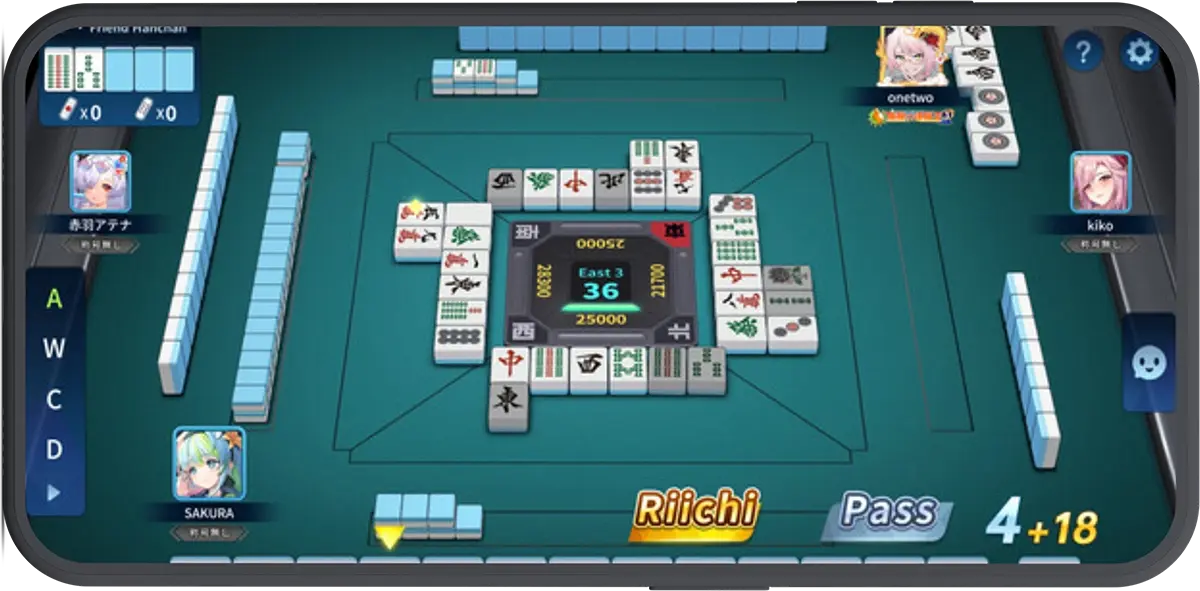The Secret World of High-Stakes Mahjong Gambling

You might think that Mahjong is just that boring (but satisfying) online game where you match up a bunch of tiles that have squiggly symbols and Chinese characters, and what looks like peacocks (it’s def a bird, we just don’t know what kind of a bird).
IRL, those tiles are tangible and are laid out and lined up on a table, and they’re probably surrounded by a group of older women. Cute, right? But in some places, those very same tiles? They are worth tens of thousands of dollars, so it’s not a friendly game among the aunties. The stakes are real, and so are the consequences.
What started out as a traditional Chinese game that was played during holidays and family gatherings has, in some circles, morphed into a serious gambling activity. In cities like Hong Kong, Tokyo, and Taipei, high-stakes Mahjong isn’t a hobby—it’s a whole lifestyle. And it’s one that’s cloaked in secrecy, gossiped about in teahouses, and occasionally can be seen on crime blotters and headlines.
What you thought was just a time-killing game in the App Store is also high-stakes real money Mahjong gambling. We are gonna find out where it came from, why it’s popular, how it went from parlors to online casino apps, and what happens when those tiles hit the tables!
A Quick Refresher: What Is Mahjong?
Okay, before we get into the high-roller drama, we should explain what Mahjong is. As we said. It’s a tile-based game, and it originated in China during the Qing dynasty. It’s sort of like a complicated, souped-up version of rummy, but there are 144 tiles instead of playing cards.
What’s the objective? To get a complete hand, which is usually four sets and a pair, you draw and discard tiles. A “set” can be three of a kind or a sequence of three—it all depends on the variation that you’re playing.
And yes, there are variations. Lots of them, and they’re listed below:
- Chinese Mahjong: The OG Mahjong. It’s based on luck, although strategic play is still very much involved. Scoring rules differ depending on the region where it’s played.
- Japanese Riichi Mahjong: Possibly the most cutthroat version of the game. Riichi has bluffing, betting, and complicated scoring, and this makes it a favorite among the more competitive players.
- Western Mahjong: This is a more chill version that has simplified scoring. It’s found mostly in American communities, and particularly among older players.
In East Asian cultures, Mahjong is not just a game. It’s a social ritual that bonds generations, fills hours during Lunar New Year, and gives people an excuse to hang out and talk smack in between tile draws. But not every game is just innocent family fun. In some settings, it’s deadly serious, and that’s when it’s played for cold, hard cash!
When Tiles Turn to Treasure: The Origins of Gambling in Mahjong
How did this family-friendly pastime turn into a vehicle for underground gambling and organized crime? Money, of course! It always finds its way into the things that people love.
- Back in the early 20th century, Mahjong spread across China, then into Japan, Korea, and eventually came to the West. It was easy to learn, fun (and addictive) to play, and could go on for hours, all of which are the perfect storm of conditions for casual betting. Small wagers turned into bigger ones. And the games turned into lucrative matches.
- In post-war China and Japan, Mahjong became a staple of teahouses and backroom social clubs, all places where businessmen, laborers, and gangsters rubbed elbows. The stakes quickly escalated, and organized groups like the Triads in China and the Yakuza in Japan saw a chance, and they took it. They weren’t only making bets; they also ran the games, banked the money, and took their cuts.
Of course, not every high-stakes Mahjong match is mob-connected. But the game’s association with secret clubs, tension, and big money has stuck. And it’s not entirely undeserved, but it is overblown.
Inside the Game: How High-Stakes Mahjong Works
High-stakes Mahjong is not the kind of thing you randomly stumble into at a casino. You have to be invited, vouched for, or you run your own table. And once you’re in? The pressure is on.

A high-stakes match usually starts out at $100 per point. That means a winning hand that’s worth 40 points could net $4,000 in a single round. Games are usually played in sessions, with four to eight rounds. Multiply that out, and you’ll be looking at five-figure nights. In the really elite circles—especially in Tokyo or Hong Kong—stakes can get ten times higher.
– The betting works like poker, but with extra math. There’s the base rate per point, extra bonuses for rare hands, and penalties for risky discards.
– Some games have “washouts,” which is when a player has to pay everyone else.
– Others are making side bets on top of the regular ones, which is comparable to prop bets in sports gambling.
Legit Mahjong tournaments do exist, but they mostly take place in Japan. That’s where professional leagues have been trying to “clean up” the game’s image. The events are televised, sponsored, and pretty transparent. But the real action is still happening in private rooms and unmarked buildings.
In underground matches, house rules differ, but the atmosphere is always the same: intense. No phones. No distractions. Just the clicking of those little tiles and the air thick with tension.
This isn’t a game for casual bettors. You basically need a photographic memory, nerves of steel, and a face that could bluff its way through police interrogation. Players have to memorize the discarded tiles, calculate odds, and bait opponents into making dangerous moves. Some players wear sunglasses or masks to hide their tells. And there are those who rely on their own rituals or talismans, which is par for the course—gamblers are a superstitious bunch.
There are legendary player names that are very real and others that have become urban legends. A Japanese pro reportedly won $1 million USD over six months playing underground Riichi. A Hong Kong financier allegedly lost his Porsche and two properties in a three-day Mahjong binge. And then there are the stories of retirees who show up, play flawlessly, clean house, and then disappear. Most of these stories are impossible to verify, but that only adds to the Mahjong lore.
The Risk Factor: Legality and Consequences
Is Mahjong legal? That all depends on where (and how) you play!
China
Technically, gambling is illegal in Mainland China. But Mahjong? It falls into a gray area. Low-stakes social games are tolerated. Anything bigger than wagering beer money? That’s when the police start to crack down, and they’ll raid parlors and sometimes arrest the players.
Japan
Mahjong is super popular in Japan, especially Riichi. There are pro leagues, TV shows, and sanctioned events. But real money Mahjong gambling? Still illegal. Most “parlors” operate in a legal gray zone, charging hourly fees and running what amounts to a betting exchange.
USA
In the States, Mahjong is mostly seen as a cultural hobby, particularly in Chinese-American and Jewish communities. High-stakes games are very rare and usually private. Still, depending on state laws, friendly wagering could land you on the wrong side of gambling enforcement.
Hong Kong and Taiwan
Both regions have bustling Mahjong scenes. Private games are common, and authorities tend to look the other way unless there’s a public nuisance or criminal complaint. Illegal parlors do exist, but they aren’t reported unless they’re connected to larger investigations.
Consequences for Players
Besides getting into legal trouble, the other big risk is debt, and it can get ugly quickly. Stories abound of players who borrow from loan sharks or put up their houses as collateral. In the underground scene, players can face threats or violence for failing to pay. It’s a game, yes. But you have to pay your debts.
Digital Mahjong and the Rise of Online Gambling
Online has breathed new life into Mahjong, and real money Mahjong gambling is now only a click away!

Legal Platforms
There are licensed apps that offer legit games for money, but only in jurisdictions where online gambling is legal. The apps simulate the high-stakes experience with slick graphics, customizable tables, and real cash wagers. Japanese pro leagues also stream games with app integration for fans who want to watch.
Shady Apps and Gray Zones
Then there’s the sketch side of digital Mahjong. Shady offshore apps that are hosted in countries with loose regulations. Apps that only take cryptocurrency. Platforms that have no licensing info or clear payout policies. Some say they are “for entertainment only” but run backroom payment systems that are def more than entertainment-only.
Even if an app isn’t using real money officially, most of them simulate the tension and structure of high-stakes Mahjong. Players devote their time, virtual tokens, and then pay to maintain their status or unlock other premium versions of the game.
Why the Obsession? Psychology Behind the Appeal
High-stakes Mahjong taps into our caveman brain: the need to outsmart, outlast, and outplay. You need some skill, but there’s an emotional factor at work. You’re solving a puzzle, and you’re doing it under pressure, there’s money at stake, and you’re doing all of this while trying to read three other people who are trying to best you.
- Prestige – In certain circles, being a great Mahjong player is a badge of honor. It means that you’re clever, strategic, and unshakable. Winning just adds to your rep, especially if it happens in a tournament.
- Adrenaline – Mahjong is more of a slow burn than a fast-paced game. It can last hours. The pacing, the mind games, the shifting tile draws—all of this creates a different kind of tension than poker or blackjack does, but it’s still an adrenaline rush, especially when you win.
- Cultural Pull – Mahjong is in the blood for East Asian players. It’s tradition, competition, and storytelling all wrapped up into one game. Grandparents played it. Friends have bonded over it. So playing Mahjong for stakes isn’t only gambling, it’s also a test of your identity.
Where the Chips Fall: Stories from the Inside
Not all Mahjong legends have happy endings. Some are warnings about the game that were served up with some hard lessons. Others were more innocuous. But all of them should make you think twice:
The Banker Who Bet It All: In 2017, a mid-level banker in Macau reportedly lost over $250,000 in a single night. He’d flown in for a “friendly” game. It went sideways fast, and he departed the next morning without his cash, Rolex, credit cards, and what was left of his dignity.
The “God Hand” Match: A 2012 Riichi match in Tokyo ended with a player winning a Yakuman hand, which is super rare, and walking away with 10 million yen. The story went viral in Mahjong circles, and the player disappeared from public tournaments after that. Where did he disappear to? No one knows, not even his family.
The Disappearing Champ: A Riichi player in Osaka once won the equivalent of $80,000 in a weekend. He took the cash, left town, and hasn’t been seen in tournament circles since. The rumor is that he was paid to stop showing up.
The Furniture Bet: A man in Guangdong lost everything in one match—his wallet, phone, and jacket. Desperate to keep playing, he bet his dining room set. He lost, and the winner made him call a moving company before he left. Yikes.
The Lucky Socks: A woman in Taipei claimed that she’d never lost because she always wore the same pair of socks. She played every weekend for six months and won, but her streak ended when she forgot them. She lost three games in a row, but at least the other players didn’t have to tolerate those smelly socks!
Final Thoughts: A Game of Skill, Luck, and Shadows
Mahjong is an outlier compared to well-known casino games, that’s for sure! And it’s straddling an odd line. It’s wholesome and nostalgic for the most part, but it can be heart-pounding and possibly dangerous when it’s being played for real money. It can both bring people together and drive them to obsession. For some, it’s simply a family tradition. But for others, it’s a high-stakes addiction.
If you feel the pull of high-stakes Mahjong, just know what you’re walking into. It’s smart, intense, and exciting, but the risks are very real, especially if you play outside of legal, regulated environments.
Know your limits. Don’t chase losses. Gamble responsibly. And if you’re playing online, make sure that the platform is legit!
Want to see if you have the skills to make it in Mahjong? You can play it in a safe, regulated space! You don’t have to sneak into a basement parlor—you can check out legal Mahjong gambling apps and platforms that have proper oversight. And you won’t be putting your financial security or your kneecaps in harm’s way.
If you’re curious about which casino apps are the best for real money gambling, you can see our picks on CasinoApps.org!


